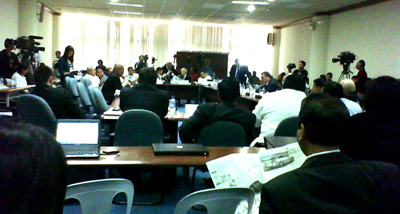Senators alarmed over imminent widespread voters’ disenfranchisement

Congress committee hearing on the elections, February 5 (CenPEG photo)
An alarm was raised at the Joint Congressional Oversight Committee (JCOC) hearing on February 5 that the Commission on Elections’ (Comelec) lack of contingency plans and other problems could lead to widespread voters’ disenfranchisement.
Sen. Rodolfo Biazon, member of the JCOC which is overseeing the May 10 automated elections, said that Comelec’s unclear response to the need for contingency in case the automated election system (AES) failed in many areas could disenfranchise many voters. He also cited other problems including the need for random manual audit and a real source code review that could bring similar results.
“I hope Comelec officials in the municipal level know what to do and what the contingency plans are,” Biazon said.
In the same hearing, Alfredo Pascual, spokesperson of the Automated Election System (AES) Watch, raised concerns with regard to the Comelec guidelines for the source code review.
Pascual said that with limited time and under the restrictions set by Comelec, an independent, thorough and quality source code review cannot be made.
The AES Watch, along with CenPEG and other coalition conveners, has served as a resource group for the JCOC on the elections.
Source code review
Meanwile, Sen. Francis “Chiz” Escudero, co-chair of JCOC, criticized the Comelec for treating the source code like a “diamond ring”. He said that the source code should be open to the public for review.
He added that there should be a clear process to ensure that the source code reviewed and tested is the same source code that will be burned in the machines.
But Comelec Chairman Jose Melo said what they can do is show the results of the review of Systest Lab to interested parties and groups. This has prompted citizens’ groups such as CenPEG, AES Watch, and other NGOs to believe that the Comelec was not really interested in a real source code review as mandated by law.
Biazon, meanwhile, reminded Comelec officials that teachers must be trained well so they can perform competently as election inspectors. He expressed concern over the results of recent field tests where some Precinct Count Optical Scan (PCOS) broke down and elections results could not be transmitted.
Poll officials also confirmed that additional ballots for the 258,691 voters who registered during the extended registration period will not be printed. Comelec Executive Director Jose Tolentino explained that changing the project of precinct now will cause delay.
The official voters list was to be released February 9.
With regard to the random manual audit, the JCOC panel urged the Comelec to have a third party conduct the random manual audit.
“I would want a third party to conduct the random manual audit so it will not be just among you. Comelec and PPCRV are the same people who have been running this whole thing since day one,” Escudero said.
The Philippine Pastoral Council for Responsible Voting (PPCRV), a citizens’ poll watchdog, has been seen by some quarters as not independent and embedded in the Comelec.
Also unresolved at the JCOC hearing is the conduct of the random manual audit. Reports show there are no clear instructions yet on the number of precincts to be audited and on how to use the results of the audit if discrepancies are found.
“Our theory,” Melo told the JCOC panel, “is that audit will be conducted after proclamation.”
Director Jose Tolentino said, however, even if proclamations will be made on the winning candidates two or three days after the election these “will not be done with finality.”
“We will proclaim but you can protest later,” he said.
JCOC panel members put it on record that this Comelec policy will cause even more confusion among the voters. (CenPEG News)
- Probing presidential platforms
- Conference calls for people-centered policy actions for Asian development and peace
- WWII 'comfort women' urge visiting Japanese emperor: OFFICIAL GOV’T APOLOGY, UPHOLD TRUTH, and JUST COMPENSATION
- FEARLESS FORECAST (EPISODE II): Comelec will not comply with e-Commerce Law in 2016 elections
- Fearless forecast: Comelec’s non-compliance with the AES law in 2016 (last of 2 parts)
- Fearless forecast: Comelec will not comply with the AES law in 2016
- CenPEG releases travelogue
- Experts: Nuisance bets reflect disillusionment, uneven playing field
- Partylist solon presses for tax cuts
- The True Cost of a Political Campaign
- Management decisions: Based on RA 9369 or purely Comelec’s?
- CenPEG holds 1st roundtable with media on presidential poll results
- Filipino IT can do it!
- FIT4E: The only transparent solution
- Realpolitik in the maritime tiff
- China’s challenge to PH sovereignty
- Choosing the next president
- Fixing the presidency, reforming the state
- New Comelec chair says he’s open to other election technologies
- SC ruling on AES Watch Pabillo and IBP vs Comelec, Smartmatic-TIM
- Comelec must explain P3.2B unliquidated cash advances
- CONGRESS ASKED TO HOLD DEMO ON PCOS HACKING
- 25 Bishops ask poll body to stop midnight deal with Smartmatic
- Pope Francis: reform and conversion
- 2 poll watch coalitions stage rally vs Comelec-Smartmatic midnight deal
- AES Watch questions Comelec-Smartmatic midnight deal
- ASEAN-India: Building Youth Partnerships through Culture and Entrepreneurship
- CenPEG forges research exchange and partnership with Jinan University
- FOI: Bearing fruit or foiled again?
- Remittance with Representation: The right to vote of overseas Filipinos
Center for People Empowewrment in Governance (CenPEG), Philippines. All rights reserved


